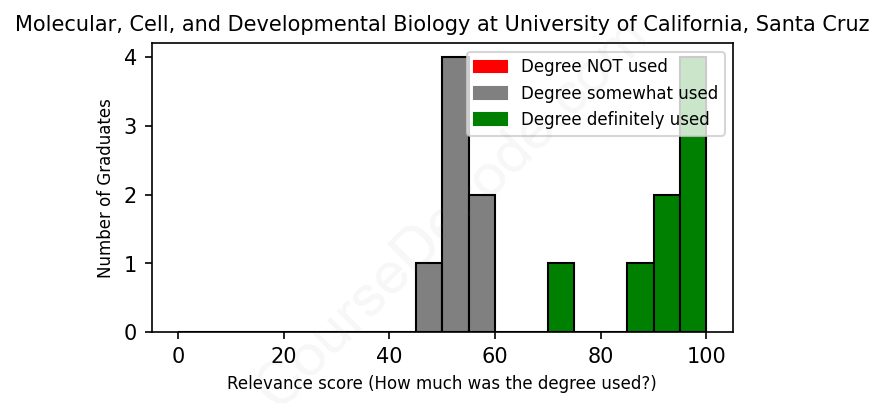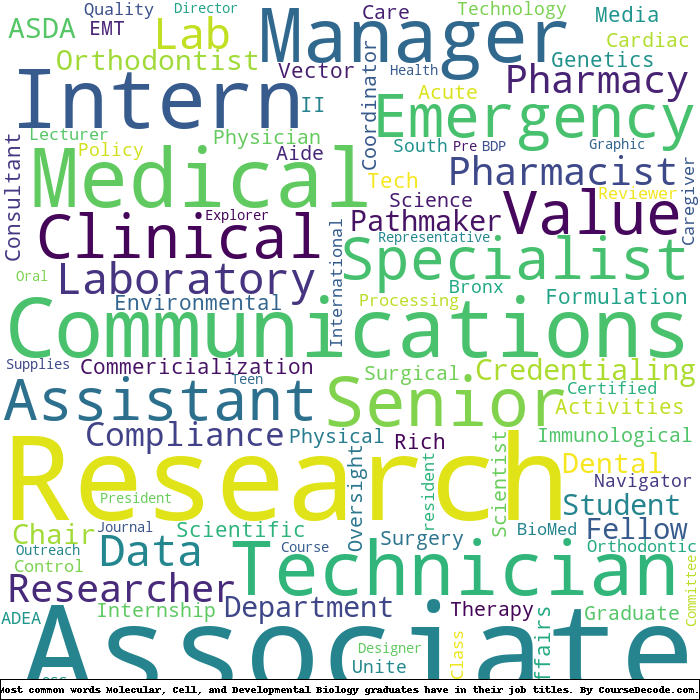
First, some facts. Of the Molecular, Cell, and Developmental Biology graduates from University of California, Santa Cruz we've analyzed , here's how many have used (or NOT used) their degree in their career:

These are estimates based on AI analysis of 15 LinkedIn profiles (see below).
The verdict? Slightly above average. Overall, with an average relevance score of 68%, Molecular, Cell, and Developmental Biology graduates from University of California, Santa Cruz have a slightly higher likelihood (+1%) of finding work in this field compared to the average graduate across all fields:
And for comparison, here's the chart for all profiles we've looked at across all degrees.
Also, after graduating, only 30% of these graduates have pursued further education other than another Bachelor's degree (such as a Masters degree or other), compared to the average across all profiles of 35%. This suggests a Bachelors degree is enough for most Molecular, Cell, and Developmental Biology graduates, and it's normal to look for work straight after graduation.
See the details:
|
Relevance score: 50% We think this person has gone into a career only somewhat relevant to their degree. We think this person has gone into a career only somewhat relevant to their degree.
DEGREE INFOGraduated in 2012 from University of California, Santa Cruz with a Bachelor of Science (B.S.) in Molecular, Cell, and Developmental Biology. Also pursued further education since (see below). JOB HISTORY SINCE GRADUATIONCaregiver Oceanside Supported Living, Inc. 2013 - 2013 Research Assistant  University of California, Santa Cruz 2013 - 2014 Research Assistant  The Hospital for Sick Children 2014 - 2015 Quality Control Associate  NBTY 2015 - 2016 Certified Pharmacy Technician  CVS Health 2018 - 2020 Processing Associate  Capsule 2020 - 2021 Navigator - South Bronx Unite  The Earth Institute, Columbia University 2021 - 2021 Research Intern  NYC Department of City Planning 2021 - 2021 Science, Technology, and Policy Fellow  U.S. Department of Energy (DOE) 2022 - 2023 Compliance Oversight Fellow  U.S. Department of Health and Human Services (HHS) 2024 - Present FURTHER DEGREES DONE SINCE GRADUATINGMaster of Public Health - MPHCUNY Graduate School of Public Health and Health Policy 2020 - 2022 ABOUTI am a public health professional with a background in biology and experience in planning, program development, and regulatory oversight. I am skilled and involved in research, data analysis, fiscal planning, stakeholder engagement, and evaluation. Using effective communication, presentation, and coordination strategies, I am able to manage projects across interdisciplinary teams and regulatory frameworks. I have carried out environmental, occupational, and safety-related projects and program development activities.I have worked on teams at private institutions, in municipal government, and in federal offices. My contributions include work in drug discovery research, ethics discussions, reviews and analyses of funding applications, planning regulation, and budget analyses. I have led and contributed to policy-related recommendations, multi-criteria decision making, risk mitigation, and metrics and evaluation tools. |
The top 10 most common jobs done by the graduates we've analyzed (ranked most common to least) are:
After checking out the job paths of people who studied Molecular, Cell, and Developmental Biology at UC Santa Cruz, it’s clear that their career choices are quite varied. A lot of the positions, like research assistant roles and internships in biotech and pharmaceuticals, really hit home with the skills they learned during their degree. For instance, jobs like Medical Communications Manager at Amgen or Research Associate roles are excellent fits, since they involve directly applying scientific knowledge and laboratory techniques. These positions make use of their deep understanding of biological sciences, which is great to see because it reflects their academic training well.
However, there are also numerous positions that don’t directly relate to their degree, like pharmacy technicians or caregiver roles. Honestly, those jobs focus more on customer service or basic medical assistance, which might not utilize their specialized knowledge much at all. It seems like while there’s a solid chunk of alumni who find relevant work in research and biotech, many others end up in positions that stray quite far from the core of what they studied. This mix shows that although a Molecular, Cell, and Developmental Biology degree opens doors in scientific fields, not every career path taken is strictly tied to that knowledge. It can really depend on personal interests and opportunities as they come along!
Here is a visual representation of the most common words in job titles for Molecular, Cell, and Developmental Biology graduates (this is across all Molecular, Cell, and Developmental Biology graduates we've analyzed, not just those who went to University of California, Santa Cruz):

Graduates from the Molecular, Cell, and Developmental Biology program at UC Santa Cruz seem to have a diverse range of career paths after their studies. Many of them start their careers in roles that are somewhat related to biology or healthcare, like research assistants, pharmacy technicians, or EMTs. This initial step often involves gaining hands-on experience in labs or healthcare environments, which is a solid starting point for students eager to apply their academic knowledge in real-world settings. It appears that the field is broad enough that graduates don't necessarily get pigeonholed into one specific role right out of college, and some even explore non-traditional pathways like internships that get them into pharmaceutical companies or research institutions.
As they progress in their careers, there’s a noticeable trend towards more specialized roles, especially in the biotech and pharmaceutical sectors. For instance, many graduates who initially worked as technicians or in entry-level positions eventually moved up to roles like medical communications manager or even high-level research positions. It appears that while some individuals take a longer route through various jobs, others manage to climb the ladder faster, particularly those who stay within the biotech field. Unfortunately, not every graduate sticks with careers directly related to their major; some end up in roles that, while respectable, may not fully utilize their training in molecular and cellular biology, like working as activity associates or credentialing specialists. Overall, it looks like most graduates find meaningful work within relevant fields, but there's a fair share who venture into other areas as well.
Getting a Bachelor’s degree in Molecular, Cell, and Developmental Biology at UC Santa Cruz can be pretty challenging. This major dives deep into some complex topics like genetics, cell structure, and developmental processes, not to mention the lab work that can be both hands-on and technically demanding. While some students might find certain classes easier or more interesting than others, overall, you’re looking at a rigorous curriculum that requires a pretty solid understanding of biology and chemistry. If you enjoy science and are willing to put in the effort, it can be super rewarding, but it’s definitely not a walk in the park!
Most commonly, in the LinkedIn profiles we've looked at, it takes people 4 years to finish a Bachelor degree in Molecular, Cell, and Developmental Biology.
It looks like the graduates from UC Santa Cruz have landed a mix of jobs that probably range from decent to pretty good pay, depending on the specific role and industry. The person who graduated in 2013 and moved up to being a Senior Manager at a big pharma company, Amgen, likely makes solid money now, especially after starting with roles that might not have paid a ton, like intern positions. Someone who graduated in 2015 is now working as a Physician Assistant, which can definitely bring in a good salary. On the flip side, there are a few who have taken on roles like pharmacy tech or caregiver, which typically don’t pay as well. Overall, it seems like most of these folks have found a way to climb the ladder in their careers and probably make decent money now, especially those in more specialized or senior roles.
Here is a visual representation of the most common words seen in the "about" section of LinkedIn profiles who have a Bachelor degree in Molecular, Cell, and Developmental Biology (this is across all Molecular, Cell, and Developmental Biology graduates we've analyzed, not just those who went to University of California, Santa Cruz). This may or may not be useful:

Here are all colleges offering a Bachelor degree in Molecular, Cell, and Developmental Biology (ordered by the average relevance score of their Molecular, Cell, and Developmental Biology graduates, best to worst) where we have analyzed at least 10 of their graduates:
| College | Score | Count |
|---|---|---|
 University of California, Santa Cruz University of California, Santa Cruz
|
68 | 15 |